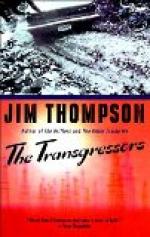Reasoning thus, he determines to make a grand effort to convert the crowd to moderation.
As he passed through the larger cities on his way to the town he heard that the people of Wilkes-Barre were up in arms. The militia have been ordered out and will arrive at any moment. The Coal and Iron Police are crossing the mountain and will show no mercy to the miners. If they find the people engaged in mischief, the story of past massacres will be repeated.
“Come with me,” says Trueman to his lieutenants. They move quickly up the steps to the piazza of the magnate’s palace.
Here Trueman turns to the crowd.
The cheering and shouting has been kept up during the two or three minutes that he has been resting. The people have again massed themselves about the grounds surrounding the house.
“Speech! speech!” they cry.
Trueman raises his hands before his face and lowers them in a sign for silence. The buzz of the thousands is instantly hushed. In a clear full voice that increases in volume as he proceeds, he begins his never-to-be-forgotten oration.
“Women and men of Wilkes-Barre:
“That you are; testified in claiming the body of the man who sacrificed his life that you might live as freemen in this land of equal rights none can deny; that you should be moved to seek revenge upon the body of the man who has of all men been the most intolerant, tyrannical and merciless to you and the hundreds whom death has claimed, during the past twenty years, is nothing more than human.
“I believe, as have the philosophers and statesmen of all ages, that the people can do no wrong; for the voice of the people is, in fact, the voice of God.”
As these words fall upon the ears of the multitude a great shout is given. Men wave their hats; women flutter their vari-colored shawls, which serve them as headgear; the sense of righteousness is awakened in them.
“With an abiding faith in the justice of the Almighty, you have bided your time; tolerance has ever been your actuating principle; reason has dictated every appeal that you have made to your masters.
“To-day you feel that the hour for your deliverance has come; that the fetters have fallen from your wrists. You stand here as emancipated men of a great nation. That your hearts should be filled with rejoicing, shows that you are alive to the importance of the occasion.
“Metz, who this day sacrificed his life for you, is worthy of your admiration. He is one of the world’s heroes, one of its martyrs. It is for you to say if he shall have a monument worthy of his memorable act.
“The peoples of all ages have had their heroes and their martyrs. The progress of the world is marked by the monuments that have commemorated the deeds of these men.
“It remains for you to erect a monument for the martyr of the Twentieth Century.
“Shall it be of brass or of enduring granite?




